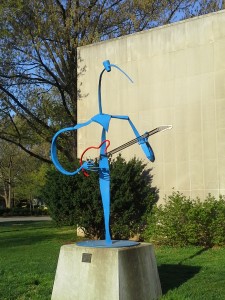When I was younger, I would look in envy at the magazine and newspaper articles about travel and dream of the day when I would jet off to new cities, new experiences and new cultures. Well, now that I am older, part of that dream has come true. I have been fortunate in the past few years to be invited to share my thoughts and music on early childhood and development across this country and sometimes outside of the country. 
Although the actual presenting is every bit as wonderful as I thought it would be, the travel experiences are getting a bit wearing. I do find myself asking “Where am I? Where am I supposed to go now?” The continued challenge of novel spaces and novel faces has me saying “Show me the way to go home.” As much as I longed for new experiences, I now find myself sighing a sense of relief when I see a well-marked sign telling me where the ice machine is. I am grateful for a lobby breakfast area that is exactly the same as it was in the last hotel. Familiarity brings a sense of comfort that allows me to relax and focus on more important ideas, such as my presentation.
I was thinking about this during the past week as I moved from city to city. I began to reflect more deeply about how my young children must feel when they are constantly challenged by new experiences and new environments. Maybe they too, feel a sense of relief when there are familiar markers. Maybe some degree of sameness and consistency allows them also to relax and focus on more important tasks.
So when I get back to my youngsters, I will pay more attention to the musical markers that clearly point the way for them and give them a chance to feel secure enough in their present position to want to explore and examine. This doesn’t mean that there will only be familiar music (after all, I still want to keep traveling despite sometimes missing home). But I will be more mindful of having clear signs pointing the way to music and within music that the children can recognize and internalize so they can concentrate on engaging, initiating and responding.
Here are some musical markers that are familiar signals that point children in the direction of musical experiences.
Pitch and key matching
The young child begins to recognize and match pitches within the first few months of life. When an adult matches a child’s pitch, or selects a key that incorporates the child’s pitch, it sends a message that the adult is listening to and respecting the music of the child. Even if the musical material is novel, choosing to use a key that is within the natural sound of the child sends a message of welcome and support.
Rhythmic grounding
Rhythm engages. Rhythm regulates. Rhythm organizes. Rhythm provides a familiar space in which children can feel safe. Beginning a music time with rhythmic grounding, maybe through patting or stamping or clapping, is a very clear sign that the experience is about to begin. A consistent rhythm says “Hi. Come on in. Sit down and join us.” Almost like being home.
Melodic predictability
We know from music and the brain research that there is natural impetus toward the fundamental tone of a familiar scale. Creating or
using melodies that have the fundamental tone as an ending point can give the child a chance to feel as if they are “going home” when hearing or making music. It gives direction to their musicing, making it possible for even unusual music experiences to feel complete and safe.
Harmonic patterns
We all know and use the ubiquitous V7 to I harmonic pattern to finish off a song or a piece of music. I use the descending 5th interval all the time along with the words “All done” to give the clue that the music is really finished. Harmonic progressions imply movement and familiar harmonic patterns can serve as the underpinning of a novel experience that still sends the message of certainty. The young child can anticipate and recognize this musical signal that they have made the journey and are now heading home.
I’ll soon head back to the airport and follow the route back to routine and schedules. It will feel good for a little while, but I know that once I get recharged and refreshed I will be itching to get back on the road again.
Hope to meet and hear from some of you in my travels.
Beth


